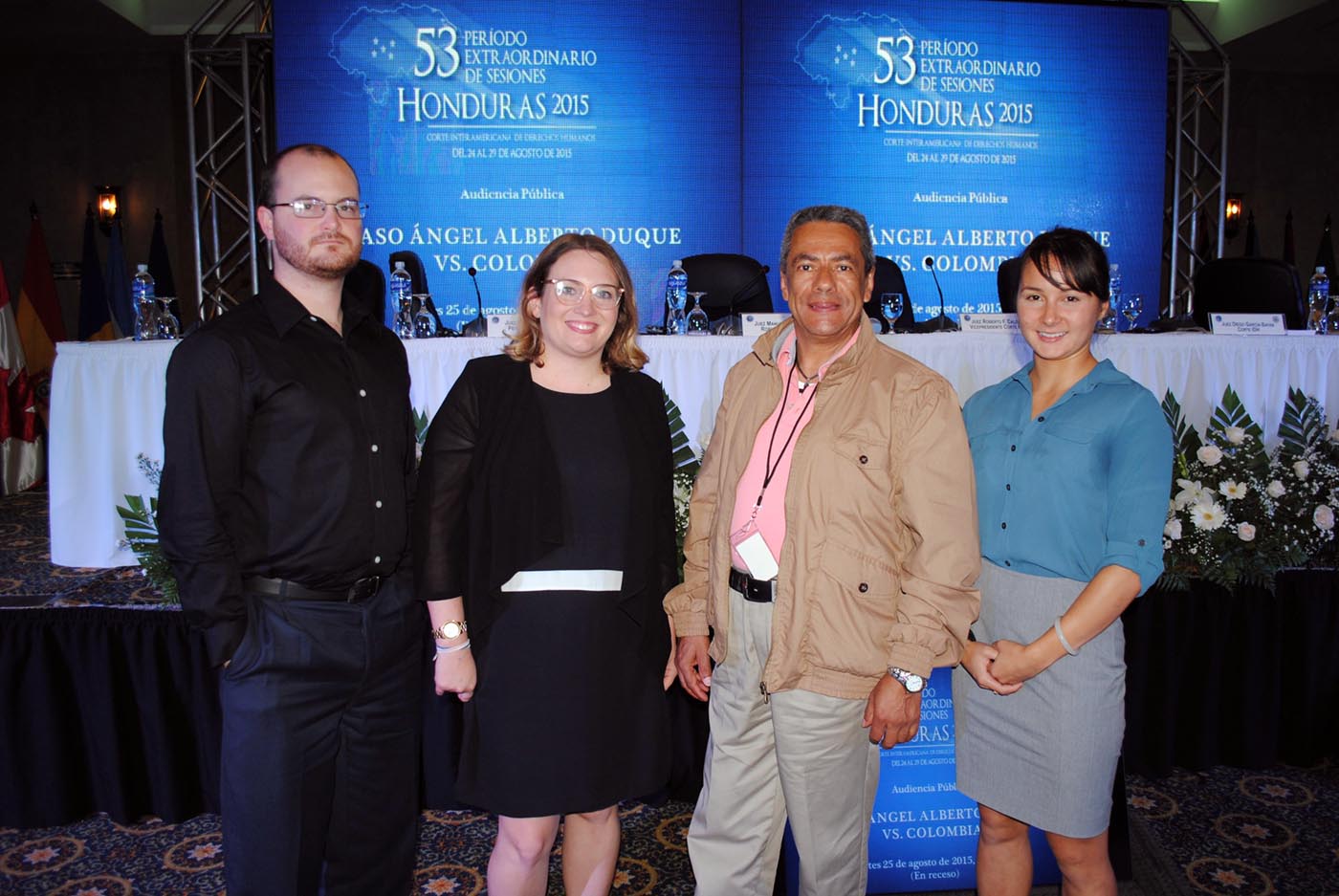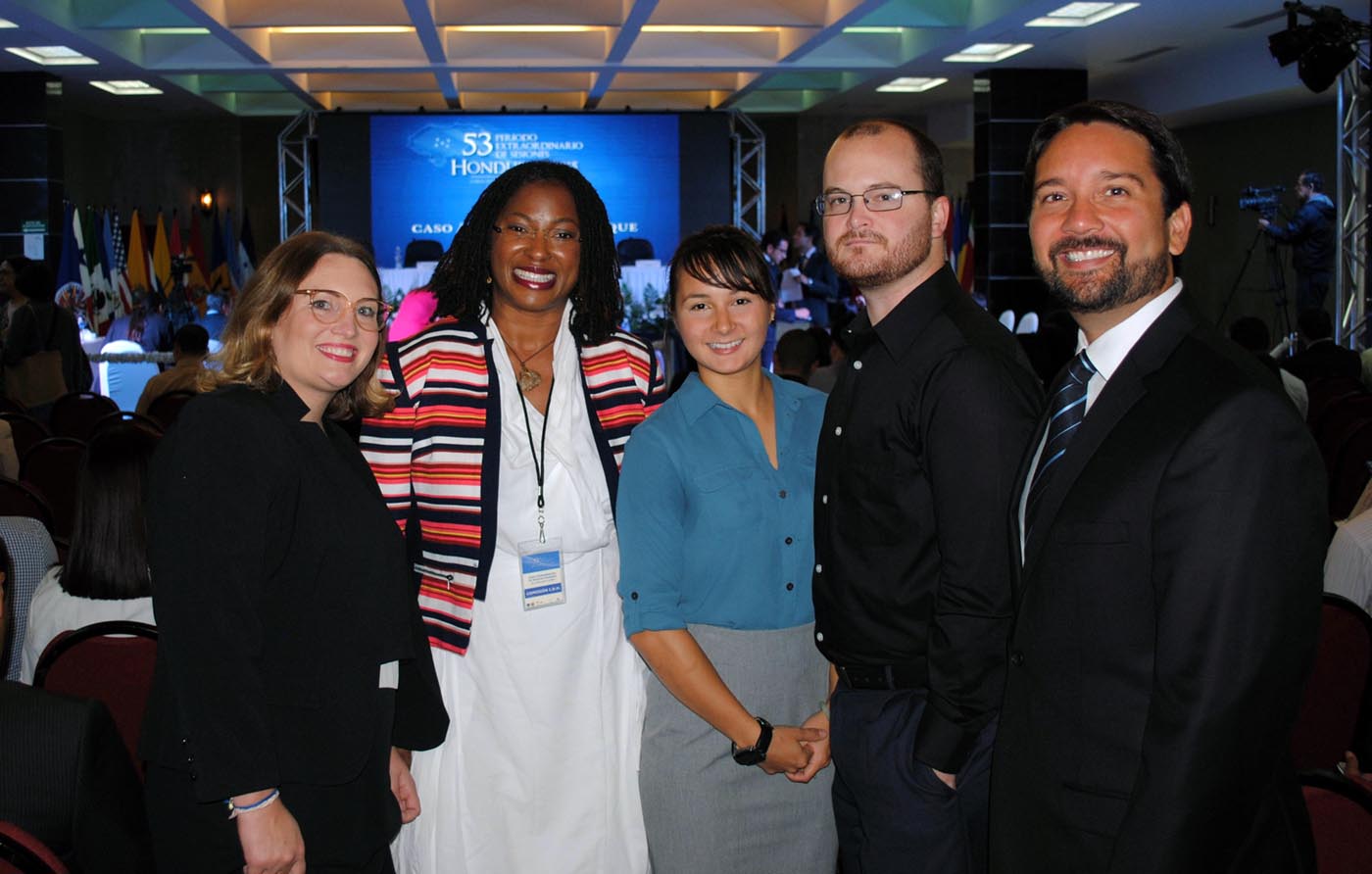(This blog post was written by IHRC students Allison Pruitt, Forest Miles, and Erica Sutter)
Barely a week into fall semester three law students and their professor were boarding a red-eye flight bound for Honduras. We – Erica, Forest, and Allison – were traveling to an extraordinary session of the Inter-American Court of Human Rights (IACtHR) in Tegucigalpa for a case involving same-sex couple’s pension rights. Under the supervision of Professor Francisco Rivera and Attorney Britton Schwartz, we were drafting an amicus curiae brief in support of the alleged victim, Ángel Alberto Duque.

IHRC students Forest Miles, Allison Pruitt, and Erica Sutter, with Ángel Alberto Duque.
Work on the amicus actually began two weeks before the semester officially started. With the hearing scheduled for August 25, 2015, we had to get an early start if we were to submit our brief on time. Per the rules of the IACtHR, the brief was due just 15 days after the hearing; real life does not, as one might suspect, follow the semester system. The case involved a Colombian man, Ángel Alberto Duque, who alleged discrimination based on his sexual orientation. While heterosexual individuals were able to receive their partner’s pension benefits upon death, laws in Colombia precluded same-sex couples from this same benefit.
Completing the brief in the time allotted was a Herculean effort involving a level of collaboration none of us had really experienced until now. With a lot of patience — and a little assistance from Google Docs — we were able to efficiently and effectively work as a team to produce a final product we are all proud of. We quickly developed a system to accelerate the writing process. For example, while one person hammered out the details for a particular section of the brief, another person would review their work and add additional references or relevant examples. If someone got stuck on a particular area, rather than stopping to track down a source or locate a specific Bluebook rule, we would flag the issue and another member of the team would come to the rescue.
The brief itself focused on two main arguments: the express extension of the prohibition of discrimination on the basis of sexual orientation to pension benefits, and the doctrine of conventionality control.
Our first argument relied heavily on the 2012 case of Atala Riffo v. Chile where the IACtHR first recognized sexual orientation as a protected social condition. There, the IACtHR held that Chile violated the American Convention on Human Rights (ACHR) when it refused to grant a citizen custody of her two daughters based on her sexual orientation. By using Atala and other similar cases from around the world we argued that the IACtHR should explicitly hold that discrimination on the basis of sexual orientation with respect to pension benefits is a violation of the ACHR.

IHRC students Allison Pruitt, Forest Miles, and Erica Sutter, and IHRC Director Francisco J. Rivera Juaristi, with Commissioner Tracy Robinson, Rapporteur on the Rights of LGBTI Persons at the Inter-American Commission on Human Rights.
Our second main argument focused more on the overarching legal principles and less on the specifics of the case at hand. The doctrine of conventionality control, first officially expressed in Almonacid Arellano et al. v. Chile, requires all domestic authorities to apply the ACHR and the Court’s jurisprudence in all legislative measures and throughout all governmental mechanisms. Our goal was to encourage the IACtHR to take this opportunity to reiterate the obligation of States Parties to apply not just the ACHR, but the Court’s interpretation thereof as well. In doing so, the Court would enforce the notion that every level of legal authority, from judges to legislators to administrators, are required to uniformly apply the ACHR as the ICtHR has interpreted it. Ultimately, conventionality control ensures a uniform understanding and development of international protections under the law in all States Parties.
In addition to the drafting process, this project also involved a groundwork component. We were all able to travel to Honduras for two days to attend the actual IACtHR hearing. To say that the trip was a whirlwind would be an understatement. We arrived in Tegucigalpa — one of the most dangerous airports to land at — around midday. After clearing customs and immigration, Professor Rivera noticed a driver holding a placard listing names of several individuals associated with the Court; rather than take our own taxi, we tagged along with this group and set off for the hotel where the hearing was being held. Due to safety concerns, Santa Clara University prohibited us from leaving the hotel, but this hardly mattered as the members of the Court were also staying at the hotel, and the hearing spanned the entire next day.
During the hearing we heard testimony from a variety of witnesses. Mr. Duque himself spoke about the “dual trauma” he experienced – first the loss of his partner of ten years, and second the loss of economic resources he desperately needed to cover medical expenses as a person living with HIV. Juan Manuel Trujillo Sánchez, a representative of COLFONDOS (a savings institution that handles pensions and severance that denied Mr. Duque pension benefits when his partner passed away), spoke on behalf of the State. René Urueña, testified on behalf of the State regarding the development of international obligations arising from international treaties and the consequences of international responsibilities of nations that have ratified those treaties. Rodrigo Uprimny Yepes, a well respected Colombian jurist, testified for the Commission. He described the legal framework of property rights and benefits for same-sex couples.
After nearly twelve hours of hearing-related activity, we made our way to our hotel rooms. By this time, we were exhausted. We had just enough energy to review our notes from the day’s proceedings and incorporate new material into the brief while it was fresh in our minds before preparing for an early start the next morning.
The next day, before we headed for the airport, we had the opportunity to briefly sit in on a lecture on “conventionality control” before rushing off to the airport. Two weeks later, we had successfully translated and submitted the final version of our amicus brief. Now, we await the Court’s ruling.
The amicus curiae brief can be downloaded in English here and in Spanish here. More than 20 organizations and individuals signed-on to the amicus, including the National Lawyers Guild, Women’s Link Worldwide, and the Vice-President of the United Nations Working Group on the Elimination of Discrimination Against Women in Law and Practice.